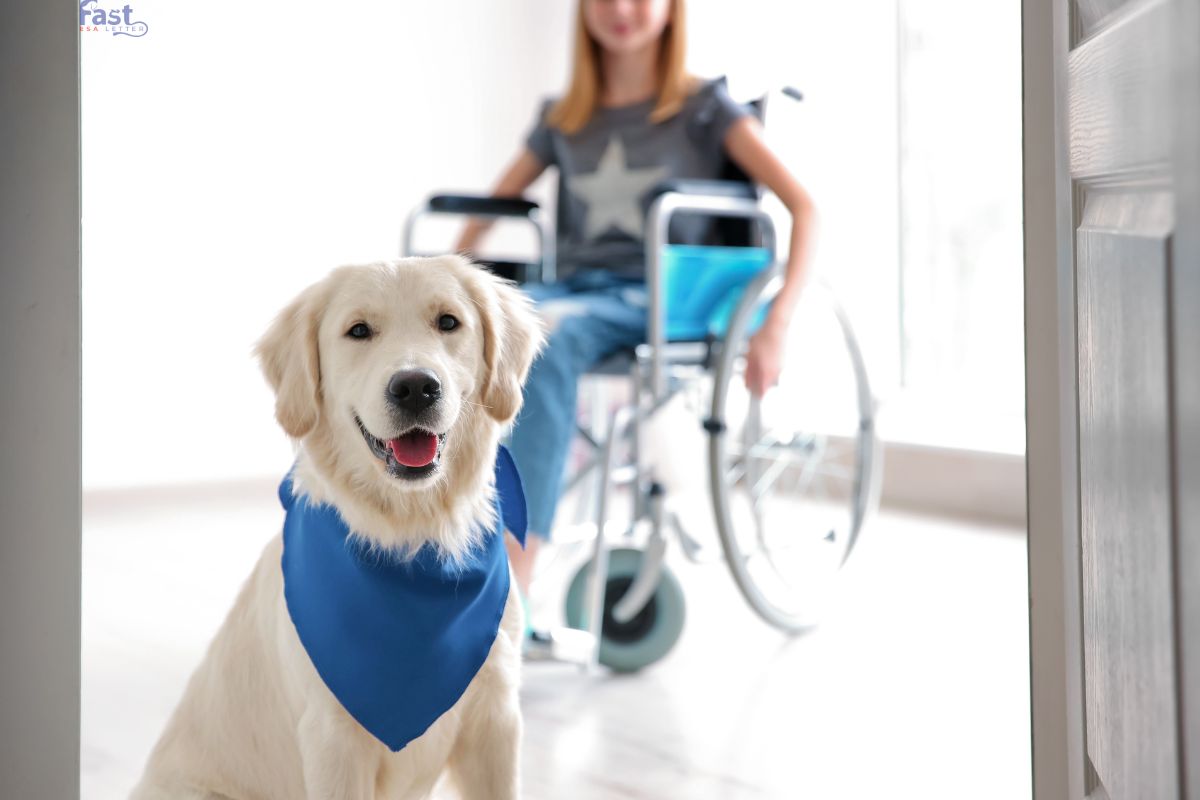How to Get a Psychiatric Service Dog in Wisconsin?

What Is a Psychiatric Service Dog?
Am I Eligible to Get a Psychiatric Service Dog in Wisconsin?
1. Diagnosis Requirement
2. Functional Limitations
3. Ability to Care for the Dog
How to Get My Psychiatric Service Dog in Wisconsin?
Step 1: Talk to A Mental Health Professional
Before getting a psychiatric service dog in Wisconsin, it’s crucial to discuss this decision with your mental health professional. They can provide a diagnosis and a letter recommending a psychiatric service dog if they believe it will benefit your condition. This letter is often required by training organizations and is useful in legal matters.
Step 2: Choosing the Right Dog
Not every dog has the temperament to be a psychiatric service dog. When selecting a dog, consider the following:
- Breed: While many breeds can be service dogs, common ones include Labrador Retrievers, Golden Retrievers, and Poodles due to their intelligence and temperament.
- Age: Younger dogs are generally preferred as they can be trained from a young age.
- Temperament: The dog should be calm, obedient, and able to remain focused in various environments.
Step 3: Enroll Dog in Professional Training
What Laws Protect Psychiatric Service Dogs in Wisconsin?
- ADA: Under the ADA, PSDs are allowed access to public places such as restaurants, hotels, and stores. The dog must be trained to perform specific tasks related to the handler’s disability, like interrupting self-harm behaviors or providing grounding during panic attacks.
- FHA: The FHA allows PSDs to live with their handlers in housing that has a no-pet policy. The landlord may request documentation but cannot charge additional fees.
- ACAA: This law permits PSDs to accompany their handlers in the cabin of an aircraft without additional charges. Airlines may require proof of the dog’s training and the handler’s disability-related need.
- Is this a service dog required because of a disability?
- What tasks has the dog been trained to perform?
Do I Need to Register My Psychiatric Service Dog in Wisconsin?
Where Can I Get a Psychiatric Service Dog in Wisconsin?
You have several options to get a psychiatric service dog in Wisconsin:
- Service Dog Organizations: Some organizations specialize in training and placing psychiatric service dogs. Examples include Custom Canines and Journey Together Service Dog Inc.
- Private Trainers: You can work with private trainers who specialize in psychiatric service dog training. This option allows for a more customized training program tailored to your specific needs.
- Rescue Organizations: Some rescue organizations train rescue dogs as service dogs. These dogs must meet temperament and behavioral standards to be considered for service work.
- Self-Training: If you already have a suitable dog, you can train it yourself with the help of professional guidance.
Which Breeds Make the Best Psychiatric Service Dogs?
The best breeds for psychiatric service dogs are those with a calm temperament, high trainability, and a strong bond with their handler. Common breeds include:
- Labrador Retriever: Known for their friendly nature and intelligence, they are excellent at performing a variety of tasks.
- Golden Retriever: Similar to Labs, they are affectionate and easy to train.
- Poodle: Their intelligence and hypoallergenic coat make them a good option for people with allergies.
- Border Collie: Highly trainable and alert, they excel in tasks requiring precision.
Where Can I Take My Psychiatric Service Dog in Wisconsin?
Under the ADA, you can take your psychiatric service dog to most public places, including:
- Restaurants and Cafes: Service dogs are allowed in dining areas but should not sit on chairs or be fed from the table.
- Stores and Malls: PSDs have the right to accompany their handlers in shopping centers and stores.
- Public Transportation: Buses, trains, and other public transportation options must allow service dogs.
- Parks and Recreational Areas: Most parks welcome service dogs, but it’s always best to check local regulations.
- Healthcare Facilities: Hospitals and clinics are required to allow service dogs, although access may be limited in certain areas like operating rooms for safety reasons.
How To Train Psychiatric Service Dogs in Wisconsin?
There are several effective training methods you can adopt to train your psychiatric service dog in Wisconsin:
- Positive Reinforcement: Reward-based training using treats, praise, or play encourages the dog to repeat desired behaviors. This is highly effective for training service tasks like deep pressure therapy or alerting to anxiety triggers.
- Clicker Training: A clicker is used to mark desired behaviors, followed by a reward. This method can help with precise training for complex tasks, such as interrupting self-harm or retrieving medication.
- Task-Specific Training: Focus on teaching the dog specific tasks that assist with your psychiatric condition. For example, teaching the dog to provide tactile stimulation during dissociation or to create a barrier in crowded places.
- Public Access Training: It’s essential to expose the dog to various public settings, ensuring it behaves appropriately and remains focused on the handler.
- Professional Assistance: If training seems overwhelming, consider hiring a professional service dog trainer experienced in psychiatric service dog training.
What Is The Training Cost of Psychiatric Service Dogs in Wisconsin?
1. Professional Service Dog Training Organizations
- Cost Range: $10,000 $30,000+
- Wait Time: 6 months to 2+ years
- Details: These organizations offer comprehensive training that includes basic obedience, advanced skills, and specific task training tailored to your needs. The cost generally includes initial assessments, training sessions, and ongoing support.
- Some of the reputable organizations in Wisconsin include:
- Custom Canines Service Dog Academy
- Wisconsin Academy for Graduate Service Dogs (WAGS)
- Journey Together Service Dog Program
2. Private Trainers
- Cost Range: $3,000 $15,000
- Wait Time: 3 months to 1 year
- Details: Private trainers can offer more personalized training plans and are often more flexible in scheduling. They can work with dogs you already own or help you find a suitable candidate.
3. Self-Training with Professional Guidance
- Cost Range: $1,000 $5,000
- Wait Time: Varies (typically 1 to 2 years for complete training)
- Details: This option involves training your own dog with occasional help from a professional. Costs may include training classes, materials, and one-on-one sessions.
4. Non-profit Programs and Scholarships
- Cost Range: Varies (often free or reduced cost)
- Wait Time: 1 to 3+ years
- Details: Some nonprofits provide psychiatric service dogs at low or no cost to individuals with disabilities. These programs are often funded through donations and can include training, placement, and follow-up support.
Examples:
- Paws for Purple Hearts (focuses on veterans)
- Canine Companions for Independence
5. Fundraising and Grants
- Cost Range: Varies (can offset all or part of the costs)
- Details: Many individuals raise funds through online platforms like GoFundMe or seek grants from organizations that support service dog training.
Tips for Reducing Costs:
- Grants & Scholarships: Research organizations offering financial aid or scholarships for service dog training.
- Fundraising: Utilize community resources and crowdfunding platforms to raise funds.
- Volunteering: Some organizations offer reduced costs if you volunteer or contribute in other ways.
Conclusion
Frequently Asked Questions (FAQs)
How Long Does It Take to Train a Psychiatric Service Dog in Wisconsin?
Can a Rescue Dog Be a Psychiatric Service Dog in Wisconsin?
What Tasks Can a Psychiatric Service Dog Perform in Wisconsin?
Can I Take My Psychiatric Service Dog to College in Wisconsin?
What Should I Do if My Psychiatric Service Dog is Denied Access in Wisconsin?
Are There Organizations in Wisconsin That Provide Free Psychiatric Service Dogs?
Can My Psychiatric Service Dog Live with Me Even If I Rent?
Will My Health Insurance Cover the Cost of a Psychiatric Service Dog?
Can Any Dog Be a Psychiatric Service Dog in Wisconsin?
What is the cost of getting a Psychiatric Service Dog?
- Initial Dog Purchase or Adoption: $500 $3,000
- Training Costs: $10,000 $30,000 (depending on the organization and duration)
- Veterinary Care and Supplies: $1,000 $2,500 annually
Post Author
Prince Sharma
Related Articles
Man With Schizophrenia Manages Symptoms With The Help Of A Psychiatric Service Dog
How PSD Helps Manage Symptoms of Schizophrenia?A Psychiatric Service Dog helps manage schizophrenia symptoms by providing emotional support, grounding the individual during hallucinations, and assisting in crisis situations. PSDs offer stability...
Why Do You Need a Psychiatric Service Dog ID Card?
Why Do You Need a Psychiatric Service Dog ID Card?A psychiatrist service dog ID card is not required by the ADA, but it can be helpful in communicating to others that your dog is a trained service animal. A PSD Letter makes it possible.In...
Anxiety and Psychiatric Service Dogs: What You Need To Know.
How Psychiatric Service Dogs Help Manage Anxiety: A Complete GuidePsychiatric service dogs help manage anxiety by providing emotional support and performing specific tasks tailored to their handler's needs. They can detect early signs of anxiety,...
Live and Fly Free with Your PSD!






